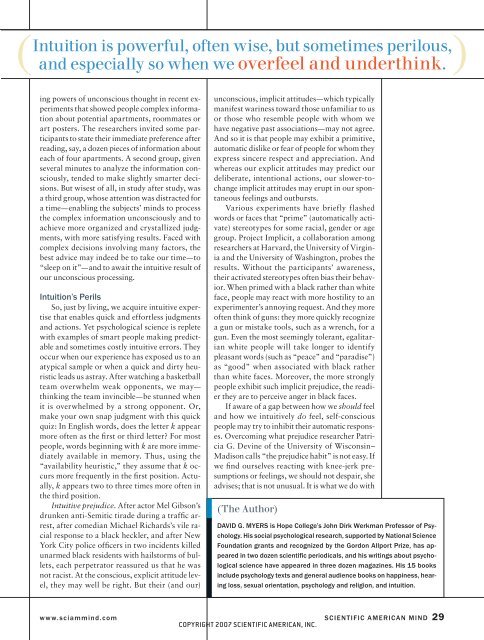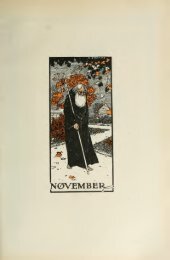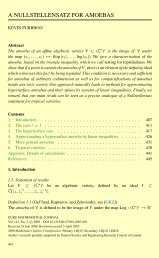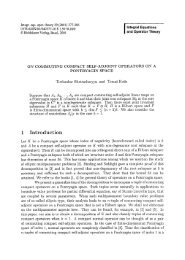Scientific American Mind-June/July 2007
Scientific American Mind-June/July 2007
Scientific American Mind-June/July 2007
Create successful ePaper yourself
Turn your PDF publications into a flip-book with our unique Google optimized e-Paper software.
( Intuition is powerful, often wise, but sometimes perilous, )<br />
and especially so when we overfeel and underthink.<br />
ing powers of unconscious thought in recent experiments<br />
that showed people complex information<br />
about potential apartments, roommates or<br />
art posters. The researchers invited some participants<br />
to state their immediate preference after<br />
reading, say, a dozen pieces of information about<br />
each of four apartments. A second group, given<br />
several minutes to analyze the information consciously,<br />
tended to make slightly smarter decisions.<br />
But wisest of all, in study after study, was<br />
a third group, whose attention was distracted for<br />
a time—enabling the subjects’ minds to process<br />
the complex information unconsciously and to<br />
achieve more organized and crystallized judgments,<br />
with more satisfying results. Faced with<br />
complex decisions involving many factors, the<br />
best advice may indeed be to take our time—to<br />
“sleep on it”—and to await the intuitive result of<br />
our unconscious processing.<br />
Intuition’s Perils<br />
So, just by living, we acquire intuitive expertise<br />
that enables quick and effortless judgments<br />
and actions. Yet psychological science is replete<br />
with examples of smart people making predictable<br />
and sometimes costly intuitive errors. They<br />
occur when our experience has exposed us to an<br />
atypical sample or when a quick and dirty heuristic<br />
leads us astray. After watching a basketball<br />
team overwhelm weak opponents, we may—<br />
thinking the team invincible—be stunned when<br />
it is overwhelmed by a strong opponent. Or,<br />
make your own snap judgment with this quick<br />
quiz: In English words, does the letter k appear<br />
more often as the fi rst or third letter? For most<br />
people, words beginning with k are more immediately<br />
available in memory. Thus, using the<br />
“availability heuristic,” they assume that k occurs<br />
more frequently in the fi rst position. Actually,<br />
k appears two to three times more often in<br />
the third position.<br />
Intuitive prejudice. After actor Mel Gibson’s<br />
drunken anti-Semitic tirade during a traffi c arrest,<br />
after comedian Michael Richards’s vile racial<br />
response to a black heckler, and after New<br />
York City police offi cers in two incidents killed<br />
unarmed black residents with hailstorms of bullets,<br />
each perpetrator reassured us that he was<br />
not racist. At the conscious, explicit attitude level,<br />
they may well be right. But their (and our)<br />
unconscious, implicit attitudes—which typically<br />
manifest wariness toward those unfamiliar to us<br />
or those who resemble people with whom we<br />
have negative past associations—may not agree.<br />
And so it is that people may exhibit a primitive,<br />
automatic dislike or fear of people for whom they<br />
express sincere respect and appreciation. And<br />
whereas our explicit attitudes may predict our<br />
deliberate, intentional actions, our slower-tochange<br />
implicit attitudes may erupt in our spontaneous<br />
feelings and outbursts.<br />
Various experiments have briefly flashed<br />
words or faces that “prime” (automatically activate)<br />
stereotypes for some racial, gender or age<br />
group. Project Implicit, a collaboration among<br />
researchers at Harvard, the University of Virginia<br />
and the University of Washington, probes the<br />
results. Without the participants’ awareness,<br />
their activated stereotypes often bias their behavior.<br />
When primed with a black rather than white<br />
face, people may react with more hostility to an<br />
experimenter’s annoying request. And they more<br />
often think of guns: they more quickly recognize<br />
a gun or mistake tools, such as a wrench, for a<br />
gun. Even the most seemingly tolerant, egalitarian<br />
white people will take longer to identify<br />
pleasant words (such as “peace” and “paradise”)<br />
as “good” when associated with black rather<br />
than white faces. Moreover, the more strongly<br />
people exhibit such implicit prejudice, the readier<br />
they are to perceive anger in black faces.<br />
If aware of a gap between how we should feel<br />
and how we intuitively do feel, self-conscious<br />
people may try to inhibit their automatic responses.<br />
Overcoming what prejudice researcher Patricia<br />
G. Devine of the University of Wisconsin–<br />
Madison calls “the prejudice habit” is not easy. If<br />
we fi nd ourselves reacting with knee-jerk presumptions<br />
or feelings, we should not despair, she<br />
advises; that is not unusual. It is what we do with<br />
(The Author)<br />
DAVID G. MYERS is Hope College’s John Dirk Werkman Professor of Psychology.<br />
His social psychological research, supported by National Science<br />
Foundation grants and recognized by the Gordon Allport Prize, has appeared<br />
in two dozen scientifi c periodicals, and his writings about psychological<br />
science have appeared in three dozen magazines. His 15 books<br />
include psychology texts and general audience books on happiness, hearing<br />
loss, sexual orientation, psychology and religion, and intuition.<br />
www.sciammind.com SCIENTIFIC AMERICAN MIND 29<br />
COPYRIGHT <strong>2007</strong> SCIENTIFIC AMERICAN, INC.

















